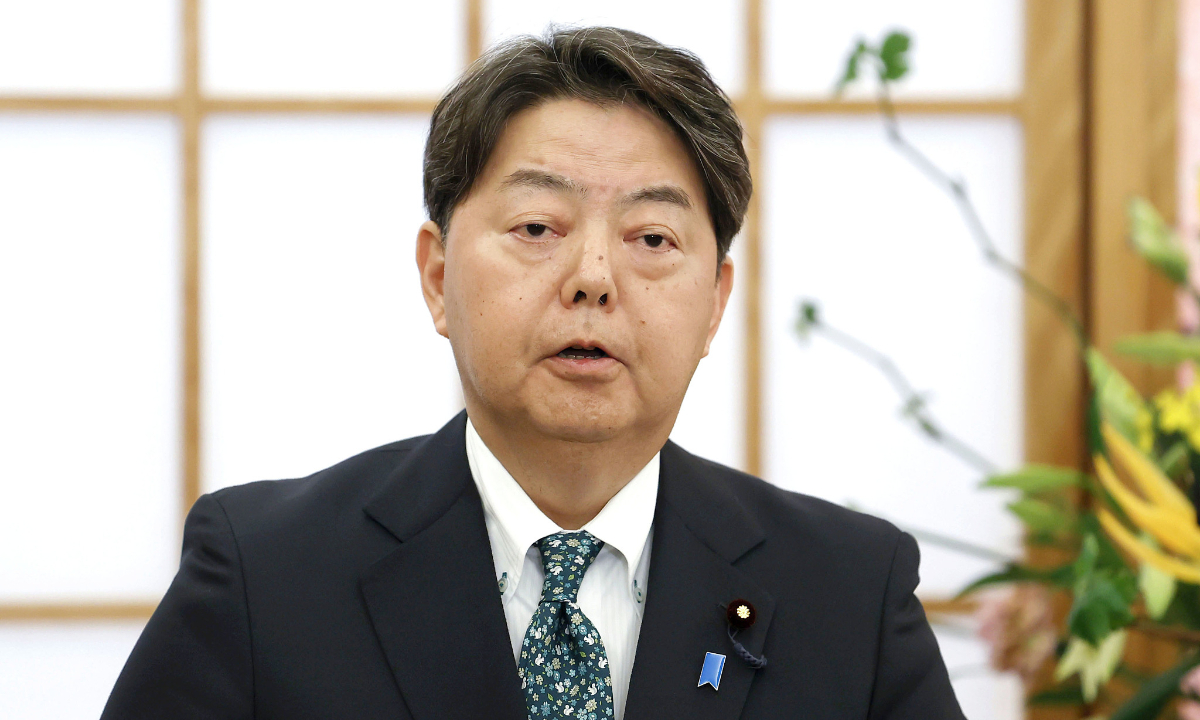
Japan's Minister for Foreign Affairs Yoshimasa Hayashi Photo:VCG
Japan's act of welcoming NATO to become more involved in Asia will only end up hurting itself by drawing wolves into its own home, experts warned on Thursday.
Japan's Foreign Minister Yoshimasa Hayashi on Wednesday said he welcomed the increased involvement of NATO member states in the Indo-Pacific region, and pledged to boost Japan's cooperation with the trans-Atlantic alliance to uphold and strengthen "a free and open international order and the rule of law," Japanese media reported.
Hayashi was speaking at an extended session of the two-day NATO foreign ministerial meeting in Brussels.
Chinese experts regarded Hayashi's move as an attempt to expand Japan's clique in the Indo-Pacific to better serve its ambitions to dominate the region and lower the costs that come with dealing with China.
"Japan has not been vague in showing its ambitions. Japan is seeking an all-round expansion of its influence on Southeast Asia, South Asia, and the situations in regions including the East China Sea and South China Sea, using a combination of measures including the building up of its own military strength, coordinating with the US' Indo-Pacific strategy, and bringing in extraterritorial forces," Da Zhigang, director of the Institute of Northeast Asian Studies at the Heilongjiang Provincial Academy of Social Sciences, told the Global Times on Thursday.
In recent years, Japan has been engaging in bilateral or multilateral military exercises with a number of NATO member states. Now, it wants to expand the cooperation to the entire 31-member alliance, which will bring a significant challenge to regional peace and stability, as well as up the risk of conflict in great power games and maritime rights disputes, experts said.
While in Brussels, Hayashi also noted that Japan and NATO are working on a revision to the Individually Tailored Partnership Program, through which Japan intends to significantly strengthen its cooperation with NATO in many new areas such as cybersecurity, outer space, disinformation and critical and emerging technologies, media reported.
Echoing Hayashi's remarks, NATO Secretary-General Jens Stoltenberg said the alliance is seeking engagement with the Indo-Pacific because of concerns over space and cybersecurity, urging collective defense in these areas "where China is rapidly expanding its presence," Nikkei Asia reported on Thursday.
"This is a major breakthrough in Japan-NATO relations, as it puts Japan on par with a NATO member state," Song Zhongping, a Chinese mainland military expert and TV commentator, told the Global Times on Thursday.
Elaborating on their new areas of cooperation in cybersecurity, outer space and other emerging technologies, Song said Japan ignores the fact that China is the biggest victim of cybersecurity and also China's commitment to the peaceful use of space. Its true purpose is to introduce NATO's military strength and resources into the Indo-Pacific region so as to both serve the US' strategy and Japan's own national security strategy of containing China.
Da added that the revisions to the pact indicated that in dealing with China or other regional powers in the future, Japan will not only focus on conventional areas such as military strength, but is also attaching increasing importance to cyberspace, space and other related technologies in the new mode of "hybrid warfare."
Hayashi's remarks came closely after his visit to Beijing, where he met with Chinese Premier Li Qiang on Sunday. During the meeting, the Chinese Premier urged Japan to meet China halfway and strengthen dialogue and cooperation, as well as manage discrepancies.
Hayashi's visit to China came at a crucial juncture when bilateral ties have spiraled to their "most severe situation" in five decades. Experts see it as offering a window of opportunity for both countries to commit to getting ties back on the right track of managing disputes via dialogue. However, with Japan still unable to shake off its distorted views of China, experts said that one visit is unlikely to bring substantial changes.
Japan should realize that by drawing wolves into its home, it will eventually hurt itself, experts warned, urging Japan to stop making trouble out of nothing.




